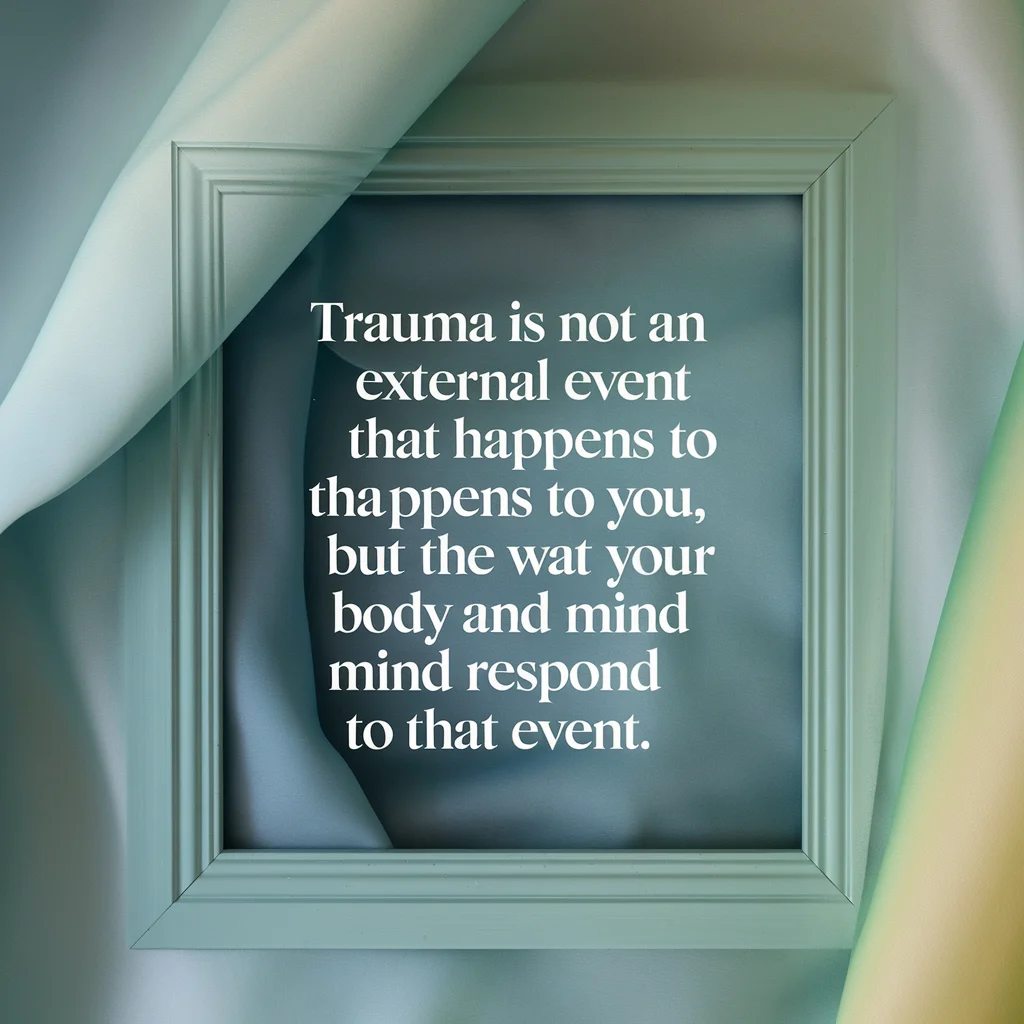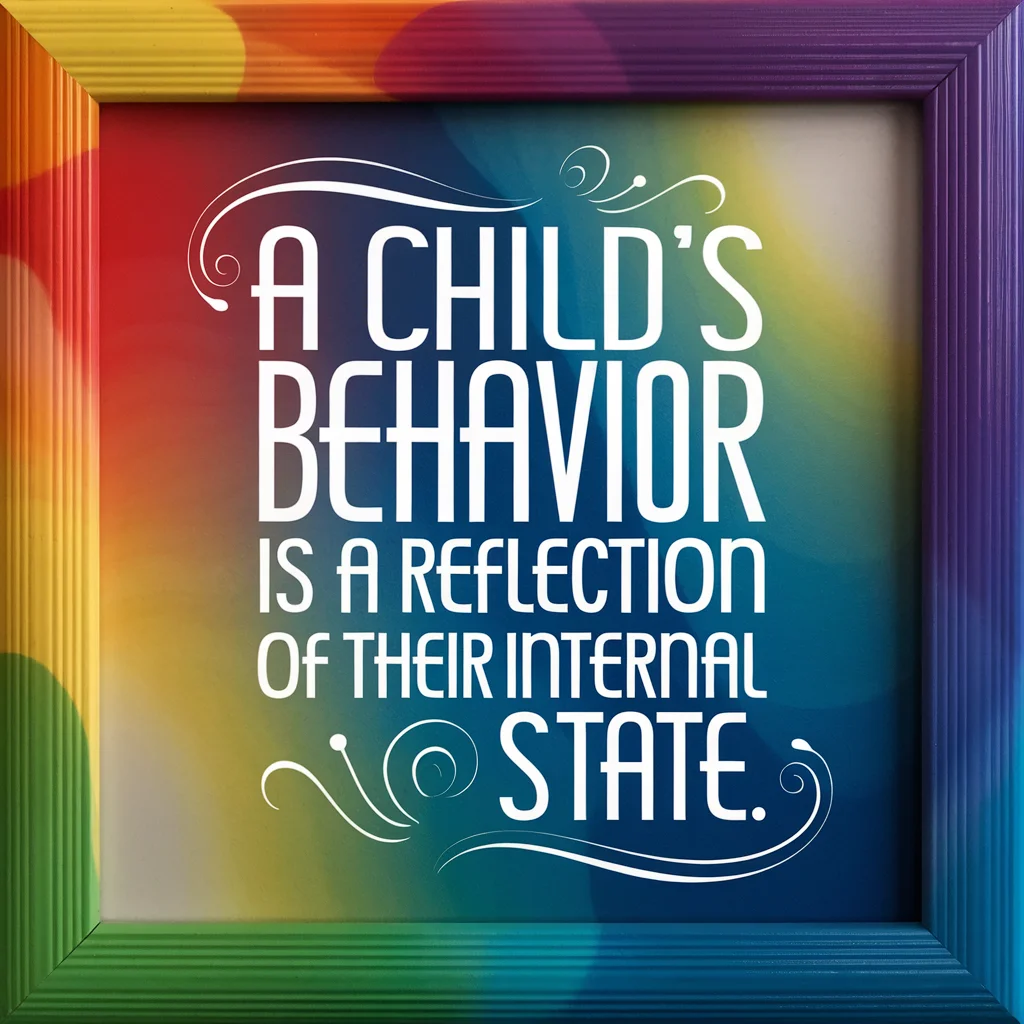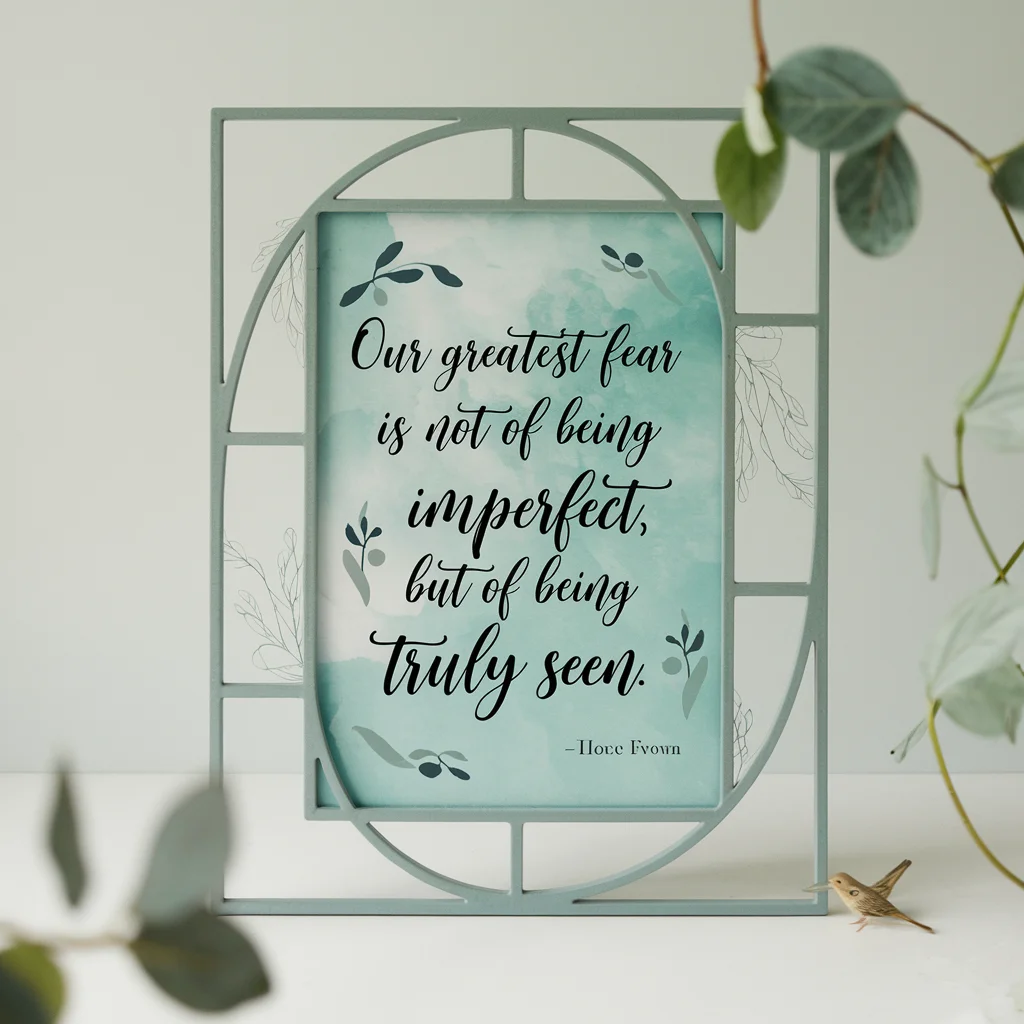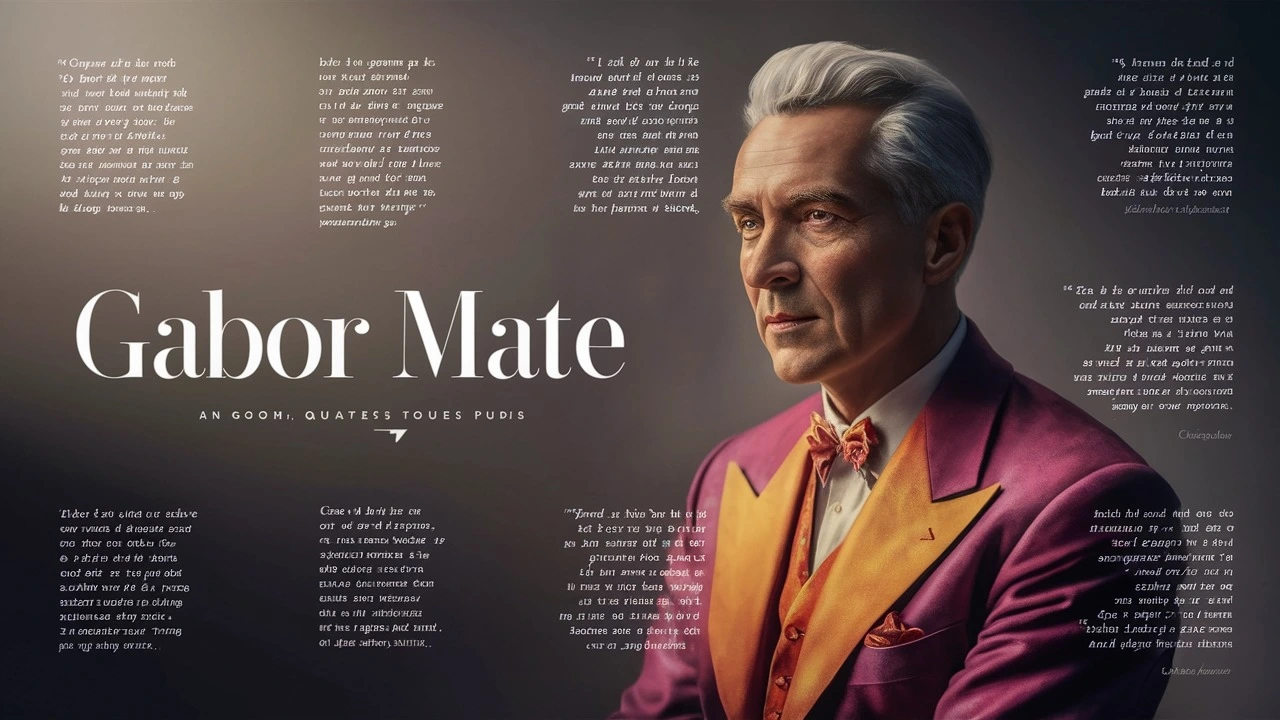Last updated on October 7th, 2024 at 08:51 am
This blog post compiles some of his most impactful Gabor Maté Quotes, organized under various themes, to provide a deeper understanding of his philosophy and teachings.
Gabor Maté, a renowned physician and author, is widely recognized for his insights into trauma, addiction, stress, and the mind-body connection.
On Trauma
“Trauma is not what happens to you. It’s what happens inside you as a result of what happens to you.”
Author: Gabor Maté
Description:
This quote highlights that trauma is not just the event itself but the internal impact it has on a person’s emotional and psychological state.
“The essence of trauma is disconnection from ourselves.”
Author: Gabor Maté
Description:
Maté emphasizes that trauma often leads to a loss of connection with our true selves, which can manifest in various mental and physical health issues.
“Trauma creates a scar, but it also offers an opportunity for healing.”
Author: Gabor Maté
Description:
While trauma leaves lasting impacts, Maté suggests that it also opens the door for recovery and personal growth.
“Healing means reestablishing connection with ourselves and with others.”
Author: Gabor Maté
Description:
This quote underscores the importance of reconnecting with oneself and forming healthy relationships as part of the healing process.
“Trauma is not an external event that happens to you, but the way that your body and mind respond to that event.”

Author: Gabor Maté
Description:
Maté points out that the true impact of trauma lies in how we internally process and respond to external events.
“Trauma is the invisible force that shapes our lives.”
Author: Gabor Maté
Description:
Here, Maté alludes to the often unseen but powerful influence trauma has on our behavior and life choices.
“In the presence of compassion, trauma can be transformed.”
Author: Gabor Maté
Description:
Maté suggests that compassion, whether from oneself or others, plays a crucial role in the healing of trauma.
“Trauma is a wound that must be tended to, not ignored.”
Author: Gabor Maté
Description:
Ignoring trauma can lead to deeper issues; acknowledging and addressing it is necessary for healing.
“The pain of trauma is real, but so is the possibility of recovery.”
Author: Gabor Maté
Description:
Maté offers hope by affirming that while trauma causes real suffering, there is always a potential path to recovery.
“Our traumas do not define us, but they shape how we see the world.”
Author: Gabor Maté
This quote reflects on how trauma influences our perceptions and experiences but does not determine our identity.
On Addiction
“Addiction is not a choice that anybody makes; it’s a response to emotional pain.”
Author: Gabor Maté
Description:
Maté explains that addiction is often a coping mechanism for dealing with deep-seated emotional pain, rather than a simple choice.
“The first step toward healing is understanding the root of the addiction.”
Author: Gabor Maté
Description:
Recognizing the underlying causes of addiction is crucial for effective recovery, according to Maté.
“Addiction is not the problem; the person attempts to solve a problem.”
Author: Gabor Maté
Description:
Maté reframes addiction as an individual’s attempt to manage their issues, highlighting the need for compassion in treatment.
“The opposite of addiction is not sobriety; it’s connection.”
Author: Gabor Maté
Description:
This quote suggests that building connections with others can be more effective in overcoming addiction than just focusing on sobriety.
“Addiction is rooted in a lack of self-love.”
Author: Gabor Maté
Description:
Maté identifies a lack of self-compassion as a key factor that drives addictive behaviors.
“In every addict’s story, you will find a thread of trauma.”
Author: Gabor Maté
Description:
Maté draws a link between past traumas and the development of addictive behaviors, underscoring the need to address these underlying issues.
“Healing from addiction requires addressing both the body and the mind.”
Author: Gabor Maté
Description:
Maté advocates for a holistic approach to addiction recovery, which includes treating both physical and psychological aspects.
“Addiction is a response to a deep, unmet need.”
Author: Gabor Maté
Description:
This quote highlights that addiction often stems from unfulfilled emotional or psychological needs.
“The pain of addiction is real, but it’s a mask for deeper suffering.”
Author: Gabor Maté
Description:
Maté explains that addiction often serves to cover up more profound emotional pain, which must be addressed for true healing.
“Healing addiction is about rediscovering our true selves.”
Author: Gabor Maté
Description:
According to Maté, overcoming addiction involves reconnecting with our authentic selves and healing the wounds that led to addictive behaviors.
On Mind-Body Connection
“The mind and body are not separate entities; they are deeply intertwined.”
Author: Gabor Maté
Description:
Maté emphasizes the inseparable connection between mental and physical health, suggesting that what affects one impacts the other.
“Stress is not just a mental state; it has physical consequences.”
Author: Gabor Maté
Description:
This quote highlights how stress can manifest in physical symptoms, demonstrating the link between emotional and physical well-being.
“The body expresses what the mind cannot.”
Author: Gabor Maté
Description:
Maté suggests that physical symptoms often represent unresolved emotional or psychological issues.
“Chronic illness often has its roots in unresolved emotional issues.”
Author: Gabor Maté
Description:
Maté points out that long-term health conditions can be linked to unaddressed emotional problems, underlining the importance of holistic treatment.
“Healing involves listening to the messages of your body.”
Author: Gabor Maté
Description:
This quote encourages paying attention to physical symptoms as indicators of deeper emotional or psychological needs.
“Our bodies are not just machines; they are reflections of our emotional experiences.”
Author: Gabor Maté
Description:
Maté argues that our physical state often mirrors our emotional and psychological experiences.
“Illness is often a manifestation of suppressed emotions.”
Author: Gabor Maté
Description:
This quote suggests that unexpressed emotions can contribute to the development of physical illnesses.
“The path to healing involves integrating mind and body.”
Author: Gabor Maté
Description:
Maté emphasizes the need for a holistic approach that considers both mental and physical aspects of the healing process.
“The body is a wise messenger, not a broken machine.”
Author: Gabor Maté
Description:
Maté encourages viewing the body as a source of wisdom that communicates underlying emotional or psychological issues.
“True health requires harmony between mind and body.”
Author: Gabor Maté
Description:
Maté stresses that achieving real health necessitates balance and alignment between our mental and physical states.
On Parenting and Childhood
“The most important influence on a child’s development is the emotional environment.”
Author: Gabor Maté
Description:
Maté emphasizes that the emotional atmosphere in which a child grows up is crucial for their overall development and well-being.
“Children are not born bad; they are shaped by their experiences.”
Author: Gabor Maté
Description:
This quote underscores that children’s behaviors are heavily influenced by the environments and experiences they are exposed to.
“Unmet needs in childhood often lead to emotional and psychological challenges in adulthood.”
Author: Gabor Maté
Description:
Maté points out that many adult issues can be traced back to unmet needs during childhood, highlighting the long-term impact of early experiences.
“Parenting is not about perfection; it’s about connection.”
Author: Gabor Maté
Description:
Maté advises that the focus of parenting should be on forming strong, meaningful connections with children rather than striving for perfection.
“A child’s behavior is a reflection of their internal state.”

Author: Gabor Maté
Description:
Maté suggests that children’s actions often mirror their emotional and psychological condition, indicating the need for empathetic understanding.
“Children need a safe emotional environment to thrive.”
Author: Gabor Maté
Description:
This quote highlights the importance of providing children with a secure and supportive emotional environment for healthy development.
“The wounds of childhood often show up in adult life.”
Author: Gabor Maté
Description:
Maté notes that unresolved issues from childhood frequently manifest as challenges in adulthood, emphasizing the importance of addressing these early on.
“Parenting is about guiding children back to their true selves.”
Author: Gabor Maté
Description:
Maté sees the role of parenting as helping children stay connected with their authentic selves amidst the challenges of growing up.
“Children learn more from what they see than what they are told.”
Author: Gabor Maté
Description:
Maté suggests that children are more influenced by the behaviors they observe in their parents than by verbal instructions, stressing the importance of leading by example.
“The way we parent reflects our unresolved issues.”
Author: Gabor Maté
Description:
This quote points out that the way parents interact with their children often mirrors their own unresolved emotional or psychological challenges.
On Compassion and Healing
“Compassion for others begins with compassion for oneself.”
Author: Gabor Maté
Description:
Maté suggests that true compassion for others starts with being kind and understanding toward oneself.
“Healing requires self-compassion, not self-judgment.”
Author: Gabor Maté
Description:
This quote emphasizes that a critical aspect of healing is approaching oneself with compassion rather than harsh judgment.
“Compassion is the antidote to shame.”
Author: Gabor Maté
Description:
Maté highlights that compassion can counteract feelings of shame, which are often at the root of many emotional issues.
“True healing is a process of reconnecting with our humanity.”
Author: Gabor Maté
Description:
Maté believes that healing involves rediscovering and embracing our inherent human qualities, such as empathy and compassion.
“We cannot heal what we do not acknowledge.”
Author: Gabor Maté
Description:
This quote underscores the importance of recognizing and accepting our wounds as the first step toward healing.
“Compassion opens the door to healing, both for ourselves and others.”
Author: Gabor Maté
Description:
Maté suggests that showing compassion can facilitate healing for both the person offering it and the one receiving it.
“The practice of compassion transforms our relationship with pain.”
Author: Gabor Maté
Description:
Maté believes that approaching pain with compassion can change how we experience and cope with it, leading to healing.
“Healing is not about fixing; it’s about accepting and growing.”
Author: Gabor Maté
Description:
This quote suggests that the goal of healing is not to eliminate our wounds but to accept them and grow from the experience.
“Compassion is the bridge between suffering and healing.”
Author: Gabor Maté
Description:
Maté views compassion as the key to transforming suffering into an opportunity for healing and growth.
“Healing begins when we stop resisting our pain and embrace it with compassion.”
Author: Gabor Maté
Description:
Maté advocates for a compassionate approach to pain, suggesting that accepting rather than resisting it is crucial for healing.
On Stress and Its Impact
“Stress is the body’s response to a perceived threat, whether real or imagined.”
Author: Gabor Maté
Description:
Maté explains that stress is triggered not just by actual dangers but also by how we perceive situations, which can affect our health.
“Chronic stress is a major contributor to physical illness.”
Author: Gabor Maté
Description:
This quote highlights the connection between ongoing stress and the development of physical health issues, emphasizing the need to manage stress effectively.
“Stress is not just about what happens to you, but how you respond to it.”
Author: Gabor Maté
Description:
Maté suggests that our reactions to stressful situations are as important as the events themselves in determining their impact on our health.
“The mind under stress can create physical symptoms in the body.”
Author: Gabor Maté
Description:
This quote underscores the powerful influence of stress on the body, where mental tension can manifest as physical ailments.
“Healing from stress requires addressing both the mind and the environment.”
Author: Gabor Maté
Description:
Maté advocates for a holistic approach to managing stress, which includes changing both our internal mindset and external circumstances.
“Stress disconnects us from ourselves and others.”
Author: Gabor Maté
Description:
Maté points out that stress often leads to a sense of disconnection, both from our inner selves and from those around us.
“Stress is not inevitable; it’s a sign that something in your life needs attention.”
Author: Gabor Maté
Description:
Maté reframes stress as a signal that something in our lives is out of balance and needs to be addressed.
“The effects of stress are cumulative, often building up over time.”
Author: Gabor Maté
Description:
This quote warns that stress can accumulate over time, leading to more significant health problems if not managed properly.
“True relaxation is not just the absence of stress, but the presence of peace.”
Author: Gabor Maté
Description:
Maté suggests that real relaxation involves not only reducing stress but also cultivating a sense of inner calm and peace.
“The antidote to stress is not just rest, but reconnection with oneself.”
Author: Gabor Maté
Description:
Maté emphasizes that overcoming stress requires not just physical rest but also a deeper reconnection with our true selves.
On Emotional Healing
“Emotional healing begins with accepting your feelings as they are.”
Author: Gabor Maté
Description:
Maté encourages people to start their healing journey by acknowledging and accepting their emotions without judgment.
“Repressed emotions do not disappear; they manifest in other ways.”
Author: Gabor Maté
Description:
This quote suggests that when emotions are suppressed, they often resurface as physical symptoms or psychological issues.
“Healing is not about erasing emotions but understanding and integrating them.”
Author: Gabor Maté
Description:
Maté emphasizes that true emotional healing involves embracing and making sense of our feelings, rather than trying to eliminate them.
“Unprocessed emotions are the root of much suffering.”
Author: Gabor Maté
Description:
This quote highlights the importance of addressing and processing emotions to prevent them from causing further harm.
“Healing requires creating space for your emotions to be felt and expressed.”
Author: Gabor Maté
Description:
Maté advocates for giving yourself the time and space to fully experience and express your emotions as part of the healing process.
“The path to emotional healing is through self-compassion.”
Author: Gabor Maté
Description:
This quote emphasizes that being kind and understanding toward yourself is a crucial component of healing emotionally.
“Emotional wounds are not signs of weakness; they are part of being human.”
Author: Gabor Maté
Description:
Maté encourages people to view their emotional wounds not as flaws, but as natural aspects of the human experience.
“Healing is a journey of reclaiming your emotional truth.”
Author: Gabor Maté
Description:
This quote suggests that healing involves reconnecting with and honoring your true emotions and feelings.
“The more we resist our emotions, the more they persist.”
Author: Gabor Maté
Description:
Maté warns that trying to suppress or avoid emotions often makes them more intense and prolonged.
“Emotional healing is about moving from fear to love.”
Author: Gabor Maté
Description:
Maté believes that the journey of healing involves shifting from a mindset of fear and avoidance to one of love and acceptance.
On Authenticity and Self-Discovery
“Authenticity is the daily practice of letting go of who we think we’re supposed to be and embracing who we are.”
Author: Gabor Maté
Description:
Maté emphasizes that living authentically involves shedding societal expectations and embracing our true selves.
“The loss of authenticity is the greatest tragedy of modern life.”
Author: Gabor Maté
Description:
This quote laments how modern society often pressures people to conform, leading to a disconnection from their authentic selves.
“True healing begins when we live in alignment with our authentic selves.”
Author: Gabor Maté
Description:
Maté suggests that genuine healing comes from living a life that is true to who we are, rather than conforming to external pressures.
“Authenticity is not a luxury; it’s a necessity for well-being.”
Author: Gabor Maté
Description:
This quote highlights that being true to oneself is essential for maintaining both mental and physical health.
“To be authentic is to be in harmony with your inner truth.”
Author: Gabor Maté
Description:
Maté describes authenticity as living in alignment with your innermost beliefs, values, and emotions.
“The search for authenticity is the search for true self.”
Author: Gabor Maté
Description:
This quote frames the journey of self-discovery as a quest to uncover and embrace our true selves.
“Living authentically means taking responsibility for your happiness.”
Author: Gabor Maté
Description:
Maté suggests that being authentic involves owning our choices and actions, which is key to finding real happiness.
“Our greatest fear is not of being imperfect, but of being truly seen.”

Author: Gabor Maté
Description:
Maté points out that the fear of revealing our true selves often holds us back from living authentically.
“Authenticity requires courage because it demands vulnerability.”
Author: Gabor Maté
Description:
This quote emphasizes that being authentic takes bravery, as it involves exposing our true selves to others.
“The more authentic you are, the less you need others’ approval.”
Author: Gabor Maté
Description:
Maté suggests that living authentically reduces the need for external validation, as we become more confident in our true selves.
On Compassionate Inquiry
“Compassionate inquiry involves asking with curiosity and without judgment.”
Author: Gabor Maté
Description:
Maté describes compassionate inquiry as a method of exploring our inner world with an open and non-judgmental mindset.
“The purpose of compassionate inquiry is to understand, not to fix.”
Author: Gabor Maté
Description:
This quote emphasizes that the goal of inquiry should be to gain a deeper understanding, rather than trying to immediately solve or fix problems.
“Healing begins when we ask the right questions with compassion.”
Author: Gabor Maté
Description:
Maté suggests that the healing process is initiated by asking thoughtful, compassionate questions that lead to greater self-awareness.
“Compassionate inquiry requires deep listening, both to ourselves and others.”
Author: Gabor Maté
Description:
This quote highlights the importance of attentive, empathetic listening as a cornerstone of compassionate inquiry.
“Through compassionate inquiry, we uncover the hidden wounds that shape our behavior.”
Author: Gabor Maté
Description:
Maté believes that this process helps reveal the underlying emotional injuries that influence how we act and interact with others.
“Compassionate inquiry helps us reconnect with our true selves.”
Author: Gabor Maté
Description:
Maté suggests that by exploring our inner world with compassion, we can rediscover our authentic selves.
“The questions we ask determine the depth of our healing.”
Author: Gabor Maté
Description:
This quote underscores the idea that the quality of the questions we ask during inquiry can significantly influence the extent of our healing.
“Compassionate inquiry is a path to self-awareness and understanding.”
Author: Gabor Maté
Description:
Maté frames this approach as a method for gaining deeper insight into our thoughts, feelings, and behaviors.
“True inquiry is not about finding answers, but about opening up possibilities.”
Author: Gabor Maté
Description:
Maté suggests that the purpose of inquiry is to expand our understanding and explore new perspectives, rather than just seeking definitive answers.
“The journey of compassionate inquiry is one of continuous learning and growth.”
Author: Gabor Maté
Description:
Maté views this approach as an ongoing process of self-discovery that leads to personal growth and deeper self-awareness.
On the Power of Presence
“Presence is the greatest gift you can give to yourself and others.”
Author: Gabor Maté
Description:
Maté highlights that being fully present with ourselves and others is a profound way to offer love and attention, enriching our relationships and personal experiences.
“Being present means fully experiencing the moment without distraction.”
Author: Gabor Maté
Description:
This quote emphasizes the importance of immersing oneself completely in the current experience, without letting distractions interfere with our engagement.
“Presence allows us to connect deeply with our feelings and with others.”
Author: Gabor Maté
Description:
Maté suggests that cultivating presence enhances our ability to form meaningful emotional connections, both with ourselves and those around us.
“The power of presence lies in its ability to transform relationships.”
Author: Gabor Maté
Description:
This quote underscores how being present can significantly improve the quality of our interactions and relationships by fostering deeper understanding and connection.
“To be present is to be truly alive in the here and now.”
Author: Gabor Maté
Description:
Maté describes presence as a means of fully engaging with life as it happens, which brings a heightened sense of vitality and aliveness.
“Presence requires letting go of past regrets and future anxieties.”
Author: Gabor Maté
Description:
This quote points out that being present involves releasing preoccupations with the past and future, allowing us to focus on the current moment.
“The practice of presence nurtures inner peace and clarity.”
Author: Gabor Maté
Description:
Maté links the act of being present to the cultivation of a peaceful and clear mental state, suggesting that presence promotes emotional and mental well-being.
“Presence is a form of self-respect and respect for others.”
Author: Gabor Maté
Description:
This quote highlights that giving our full attention to ourselves and others is a way of honoring both our own needs and the needs of those around us.
“When we are present, we become more attuned to our true needs and desires.”
Author: Gabor Maté
Description:
Maté suggests that being fully present helps us connect with and understand our authentic needs and desires, leading to more genuine living.
“The art of presence is to remain engaged and mindful in every moment.”
Author: Gabor Maté
Description:
Maté describes presence as an ongoing practice of staying actively involved and aware in each moment, which enhances our overall experience of life.










